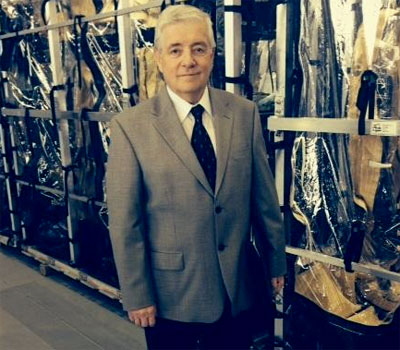(This story originally ran in 2013)

Production Products Manufacturing & Sales Co., Inc., headquartered in north St. Louis with additional plants in Buffalo and Fulton, is the largest small manufacturer you’ve never heard of.
With about 170 employees, 370,000 square feet of manufacturing space and revenues that fluctuate from $20 to $30 million, Production Products is probably the world’s largest producer of chemical/ biological protective shelters and equipment for all branches of the military and for many of our allies. Their products can be found in the White House, Pentagon, even on Air Force One. President Bill Clinton dropped by to make a speech in the late 1990s. So did Mitt Romney in 2012.
But the Hispanic-owned minority manufacturer makes more than protective bio-chem equipment. Much more.
Since Barry Corona, president, founded Production Products in 1978, the firm has received more than 25 awards, from the Outstanding Achievement Award during Desert Storm to awards from the army and SBA for helicopter components. It also makes shoulder-fired bunker-buster missiles, vehicle bumpers and tow bars, submarine storage containers, Joint Strike Fighter nose booms, MRI tubes, fuel tanks, electronic components, and chaff and flare dispensers protecting aircraft from missiles. This list doesn’t include recent multi-million dollar awards to develop a new generation of chem-bio shelters, among other research projects.
That’s a lot of product territory. “Yes, it is,” admits Corona. “We do lots of different things, but our core competencies are composites, electronics, machining, engineering and textiles. As a small business today, unfortunately, you have to be able to move with the market. It’s dynamic, and unless you are capable of doing more than one thing, you can quickly find yourself out of business.”

Production Products co-founder and president Barry Corona in front of the Transport Isolation System. (Photo/Maria Altman)
Corona was introduced to the vagaries of the marketplace almost immediately after resigning from Parker Hannifin, one of the largest motion control technology companies in the world. Corona was sick of being continually on the road, knew the petrochemical industry was well-represented in St. Louis and decided to start a business with $500 making gaskets and seals for the petrochemical industry in his garage. The business grew.
“Then I came home one night and saw the Bhopal disaster on TV. Within six months, insurance companies were looking hard at liabilities of all the chemical plants and raised rates so high most of them shut down.” The Bhopal disaster was a 1984 Union Carbide gas and other chemicals leak that occurred in Bhopal, Madhya Pradesh, India.
Corona was not about to quit, however, so he went to the United States Army Aviation and Missile Command (AMCOM, responsible for the Army’s missile, helicopter, unmanned ground vehicle and unmanned aerial vehicle weapon systems) and Tank-automotive and Armaments Command (TACOM), then headquartered in St. Louis, to drum up new business.
“And I said, ‘What can I do for you?’”
The answer was not gaskets and seals but cargo bags. “So I went into textiles not knowing a thing about it.”
There he also met Carolyn Jones, now director for MO PTAC St. Louis eastern region, then working for AMCOM. She gave the firm its first order.
That first military order was for heavy-duty air delivery cargo bags. Corona found the material. But how on earth was he going to manufacture bags? St. Louis is not known for its stitching industry.
“I went over to the Missouri Department of Economic Development (DED) and talked to them about exactly where textile plants were closing in Missouri. I found the Stride Rite Shoes plant that had been in Fulton since the 1950s was getting ready to close. DED put us in touch with Stride Rite.” Production Products moved right in, providing a seamless employment transition for many workers. The firm later did the same with a plant in Buffalo.
These employees have since learned to be swift and adaptable. People in all three plants have had to upgrade their skills from making shoes, jeans and bib overalls to composites, electronic assembly and anti-missile systems.
“Everything we make is life support, everything is 100 percent inspected, has to be 100 percent right,” Corona says. ”If your jeans rip or shoe blows a sole, it’s at best annoying. If one of our products doesn’t work, someone dies.”
Corona is quick to point out that his continuing success isn’t due solely to his efforts but to individuals at several state and federal agencies and MO PTAC, especially Jones.
“We go way back with Carolyn — 35 years! She is a quality individual, she understands her job, understands small business, knows how small business and government work together.”
She and other PTAC procurement specialists helped Production Products identify potential subcontracting opportunities; set up a bid-matching profile that gives a firm notice of current federal, state and local government bidding opportunities; track down contracts’ technical characteristics, cross-referencing coding and pricing information; and nail down keywords describing what the firm produced. The military, as everyone who has had any contact with it knows, is fueled by jargon and keywords.
Jones has since moved to another St. Louis office; Corona’s MO PTAC rep is now Millie Miller-Hoover, St. Louis County procurement specialist.
“We’ve known her forever, too. She’s also worked on the government side and understands how things work.
“PTAC services have allowed us to look at virtually every business opportunity that the federal government issues and allows us to access specifications and other data,” Corona says. “We have been able to grow our business and keep our people employed in what would otherwise be very difficult economic times. All the people at PTAC have been great to work with.”
2015 update
What have Corona and the firm, probably the country’s largest producer of chemical and biological protective shelters and equipment for our military and allies, been doing since then?
Helping whip the Ebola virus.
And thinking about severe acute respiratory syndrome (SARS), which grabbed headlines last decade. And the great flu pandemic of 1918-1919, which killed more people worldwide than did World War I.
About six or seven years ago, when you couldn’t turn on the news without hearing about SARS, Production Products was commissioned by the Department of Defense to come up with a system for transporting infected patients. SARS is potentially far more deadly than Ebola. SARS is airborne, so just breathing the same air an infected person breathes can infect another person, whereas Ebola is spread by touching the blood or body fluids of an infected person.
“All that summer, you’d see the doctors flying back to Atlanta, getting off the plane on CNN,” said Corona. “And all the units they flew people back in were ours.”
SARS was then, presumably, contained. The remaining ABCs sat in a warehouse.
Then last year, the Ebola epidemic leaped to the world’s attention. In response, approximately 3,800 U.S. military personnel were deployed to West Africa. And the military wondered how to safely transport military personnel back home if infected.
Corona and Production Products had the answer: Expand one-person ABCs to multiple-person Transport Isolation System (TIS). The TIS is comprised of a disposable plastic lining within a metal frame that includes an air filtration system. The structure is built on a pallet for ease of movement on and off military aircraft.
Corona said his firm was approached by the Department of Defense last August. The new system was available in November.
“A program like this typically takes two years,” said Corona. “We worked weekends and nights, and the units had to pass flight tests, too. We had to pass flight safety procedures on top of everything else!” He said the first TIS units were ready in just more than three months — “That’s just unheard of,” he said.
Gen. Paul Selva, commander of U.S. Transportation Command, which manages all transportation for the Department of Defense, said in an interview he was also pleased.
“This gives us the ability to move the patient in a completely isolated environment from the rest of the cargo and passengers, and that’s a big deal,” he said.
“We are making things that save people’s lives,” said Corona. “And that’s a good feeling.” The firm has three plants in Missouri, one in economically depressed Buffalo.
As for the 1918-19 pandemic, Corona said, “Today, we are so global, if a deadly outbreak like that breaks out in an obscure place, it can spread around the world within a month. The TIS gives the military the ability to take care of the next horrible outbreak.
“It (the TIS) is something you want to have, but hope you never have to use.”